It’s not just the performance
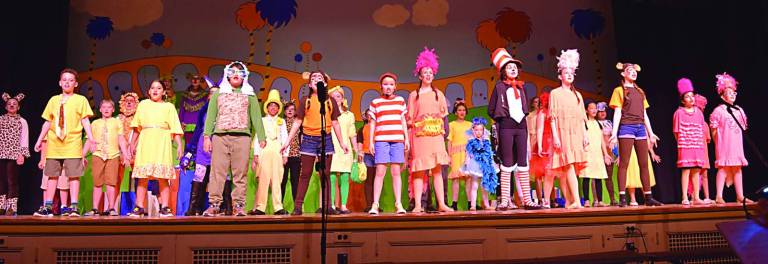

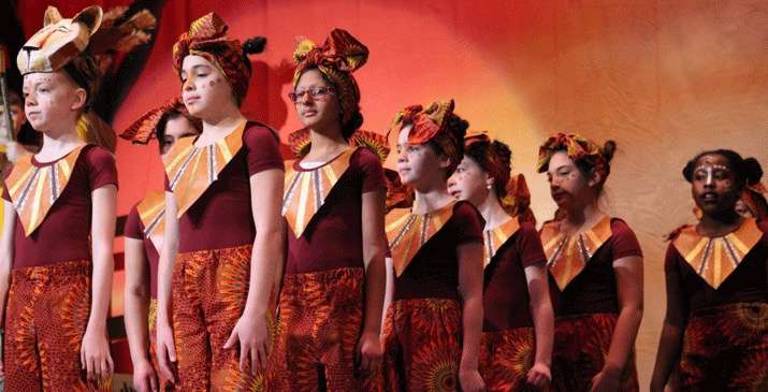
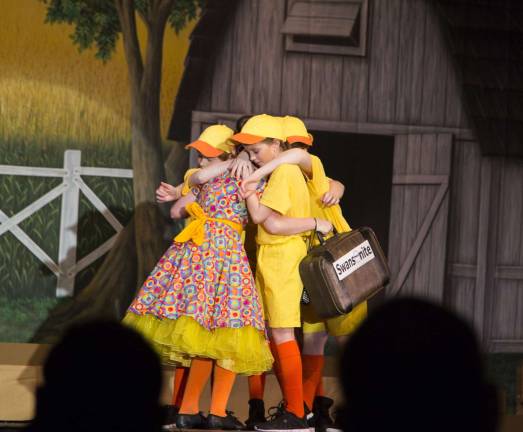
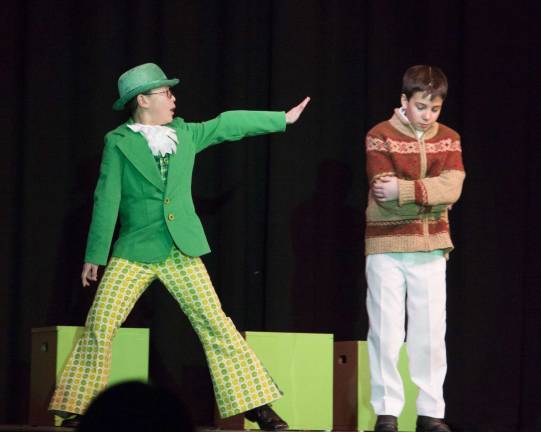
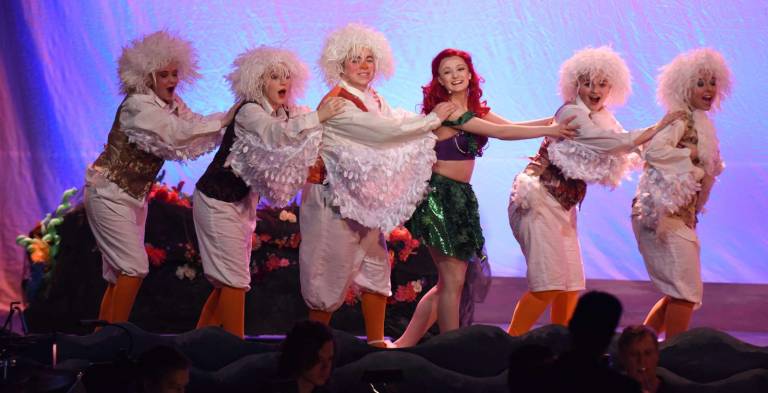


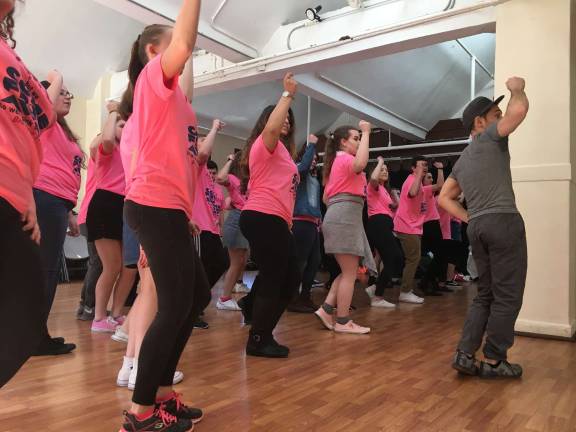
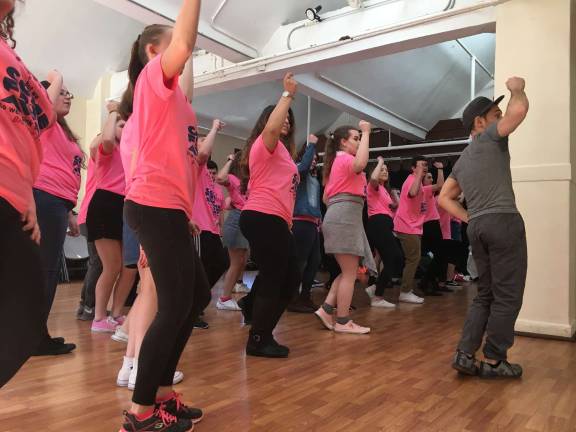
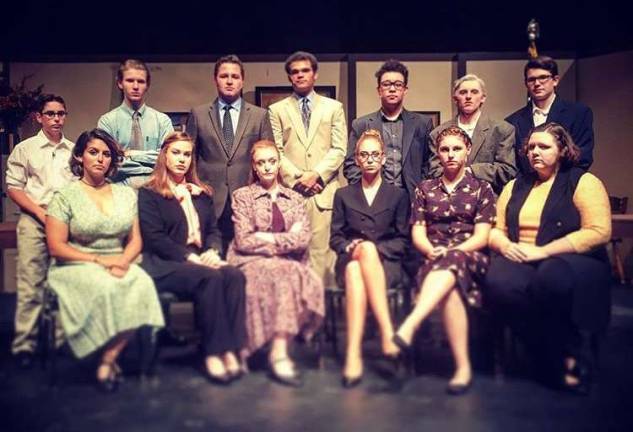
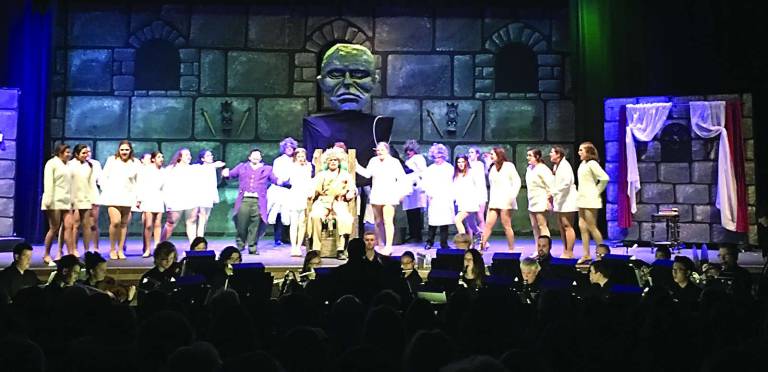
By Christine Urio
“All the world’s a stage” is really true for students who join their school’s drama clubs.
Courses in math and history are important, educators will always say, but the arts also play a significant role in the education of young people. That’s why so many districts offer drama clubs as one of their after school activities.
“Drama club is all to some, but some to all,” said Christy Brown, the music and orchestra teacher, as well as the drama club director at Warwick Valley Middle School. “The students who are involved love being a part of it, and it’s a huge part of their lives with commitment to rehearsals and learning all of their songs and lines.”
While drama club requires a lot of perseverance, it also gives students the chance to escape from reality … for just a bit.
“For some kids, theater is an outlet, or a way, for them to escape their daily stressful lives,” said Lindsay McAloney, the drama teacher and theater director at Vernon Township High School. “In my classes, students have the opportunity to pick out monologues and sometimes, you can tell when a student has connected to a piece because they’ve lived it. So it gives them the opportunity to share a part of their life with others that they may not feel comfortable sharing in normal conversation.”
Correlation between building confidence and critical thinkingAngela Deluccia, the Sparta High School spring musical director, agreed.
“Drama is a very important role in young people’s lives because it gives them an opportunity to escape from reality and enter a world of their own that highlights their passion to perform,” she said.
Participating in drama also has the additional benefits by fostering various aspects of “who” students are, helping them grow in countless ways.
“Aside from the well-known aspects of self-esteem and confidence building, drama is directly correlated with higher reading comprehension and drama students show a higher level of empathy and tolerance due to in-depth script and character analysis,” said Heather Burns, theater arts teacher and musical director at West Milford High School.
Not only that, but being involved in drama also helps develop critical and creative thinking which is important both academically, and in life.
“Working on a play, or musical, taps into our creativity, allows us to be problem-solvers, enables us to think on our feet, makes us work collaboratively, helps us communicate verbally and non-verbally, teaches us to be dedicated and loyal, and just have fun,” said Kate Loftus, social studies teacher and founder of the drama club at C.J. Hooker Middle School in Goshen.
Cohesion within a school communityThankfully, the importance of the drama club has been recognized and programs have not needed to be cut back due to budgetary restraints. Instead, programs have been met with support from both the administration and the community. With the help of fund raising, programs are expanding.
“Central Valley’s Drama Club is entirely self-funded,” said Michele George, orchestra teacher at both Central Valley Elementary School and Monroe-Woodbury Middle School. “We pay for costumes, set pieces, and technology with the money made from bake sales, T-shirts, and theater boosters. We are also very lucky to have many dedicated volunteers who selflessly give their time, skills and materials.”
Many educators echoed that it truly takes a village to create a successful drama program, showing how the community and the program work hand in hand.
“There are so many things that make a drama program successful because there are many working parts, and everyone involved needs to able to communicate and solve problems together, remain flexible and bounce ideas off one another,” Loftus said. “Within the school setting, programs are successful when everyone works together, which includes the director, producers, students, teachers, parents, as well as the principal of the school.”
Drama activities are a very public way for schools to show the community that good things are happening in their buildings.
“Many drama programs do outreach work to other schools in the district, or include special performances for community members like senior citizens,” said George.
With dedicated students, a supportive staff, long hours, community support and a passion for the arts, all these components make having an outstanding drama program come naturally.
“I think the most important thing for a good drama program is ensuring that the students have an authentic theatrical experience, to audition for the production, adhere to a strict rehearsal schedule, teach children using real theatrical terms and methods, and try to make the production as professional as possible by putting a lot of time and energy into elements like scene work, music, sound, and costumes,” George said. “The kids absorb all of this and really rise to the occasion. I always tell my cast members that it’s not enough for them to just be ‘cute.’ I want them to actually be good - to totally entertain their audience.”
Drama teaches maturityAlong with this, being involved in drama also teaches students about maturity.
“They learn to be ‘okay’ with not being great and understand that if they perform, there’s always something they can work on or do better at, and that’s okay,” said McAloney. “In my classroom, I’ve cultivated a climate where kids look to their peers for brutally honest feedback on their performances and if they get feedback, they’re still okay, if not better, because they can fine tune their work.”
While that type of feedback can be hard to handle, it teaches students skills they will need in the future.
“They’re going to get that when they step into the real world and get jobs, and I think this prepares them for that,” McAloney said. “They don’t get defensive or upset. They’re appreciative of the constructive critique and then use that to make it better.”
Many students become involved in drama to gain these necessary and powerful real life skills.
“I have a lot of students that are not planning on pursuing a career in the arts, but take the class as to become a better speaker,” she added. “They want to learn the skills to be able to command a room full of business associates or their future employees.”
Not only that, but teaching theater arts improves academic performance of students as well.
“Theater also often includes other subject areas like music, visual art, script analysis and other skills taught in English, historical time periods and situations, measurements and math skills, building and constructing sets, props and costumes,” Burns said. “It also opens students to social and political situations, community involvement and gives voice to those who may not have one anymore.”
Not only that, but being involved in the drama club increases attendance in at-risk students, and also reinforces important concepts such as empathy, teamwork and humility.
“Drama helps build student confidence, generates new friendships, and creates memories that last a lifetime,” said Brown. “Drama programs should be in every school because they help create a well-rounded child who appreciates the arts.”
Drama is important because it’s unlike any subject students will learn in school, for they can make it their own and get to collaborate in different ways from academic environments.
“The arts are equally important as anything else,” Deluccia said. “They contribute fully to the physical, social and emotional health of our students. Theater builds self-confidence and offers opportunities for students to be leaders in unorthodox ways.”
Drama programs are also gateways to starting some students’ careers and futures.
Drawing kids from different social circles “With the cast, crew, orchestra, and front of house, we had around 85 to 100 students involved in this year’s musical and that’s not including my technical theater class and acting classes that helped with the production as well,” McAloney said. “That’s around a tenth of the population involved in an after-school activity that not only keeps them continually learning something, but also keeps them engaged, entertained, and part of a team, which is pretty awesome.”
Because drama club requires so many people to put on a show, it provides an inclusive environment.
“In school, the drama club is a wonderful place to involve a large number of the student body and community since a musical production takes an enormous amount of people to run, including cast members, stage crew, musicians, seamstresses, and volunteers,” said George. “Drama clubs are also very inclusive, involving all different sorts of kids from different social circles and other activities.”
The notion that drama club is just for acting is long gone, for there are multiple components necessary for putting on a successful show.
“We have something for everyone … we need singers, dancers, and actors, but they also need to be seen and heard, so we need technical crews as well,” McAloney said. “If someone is interested in the technical aspect of theater, there are numerous outlets for that, whether it is lighting, sound, backstage crew, costuming, hair and makeup, front of house, or advertising.”
Because of this inclusivity, drama club allows students with different talents to showcase their work while creating a safe environment for students to be themselves.
“It is important that my young actors feel they can be themselves and that they can trust their fellow cast mates,” Loftus said. “They need to understand that they are a team, and much like a soccer team, putting on a show requires the same teamwork and dedication of sports, so they should support one another.”
At the elementary level, students also receive the support from parent volunteers.
“We have a large parent presence, which can be really special,” said George. “Many students have multiple family members assisting with drama club in some way, and it forms a lot of great memories not just for the students, but the whole family.”
‘They just get it’But that’s not the only family that is involved in drama productions, for the cast and crew form a familial bond, too.
“I participated in drama when I was in school and I can tell you there is no tighter group of kids than kids that perform together,” McAloney said. “It gives these kids a sense of family and accomplishment that they might not get from anything else they do in high school.”
George agreed that the friendships and memories formed during the rehearsal process are some of the fondest memories to be made.
“There are always memorable situations, inside jokes and silly stories,” she said. “As for performing, there is not much better than getting a great laugh from your audience or a rousing round of applause at the end of a musical number.”
Watching these students grow and develop in drama throughout their years in the district proves to be the educators’ favorite memories.
“Students become more comfortable with themselves not even just as actors, but as humans,” said McAloney. “They gain a greater respect for others and what they’re going through, because drama teaches them to step in other people’s shoes and be empathetic. They just get it. And for that, I’m extremely thankful.”